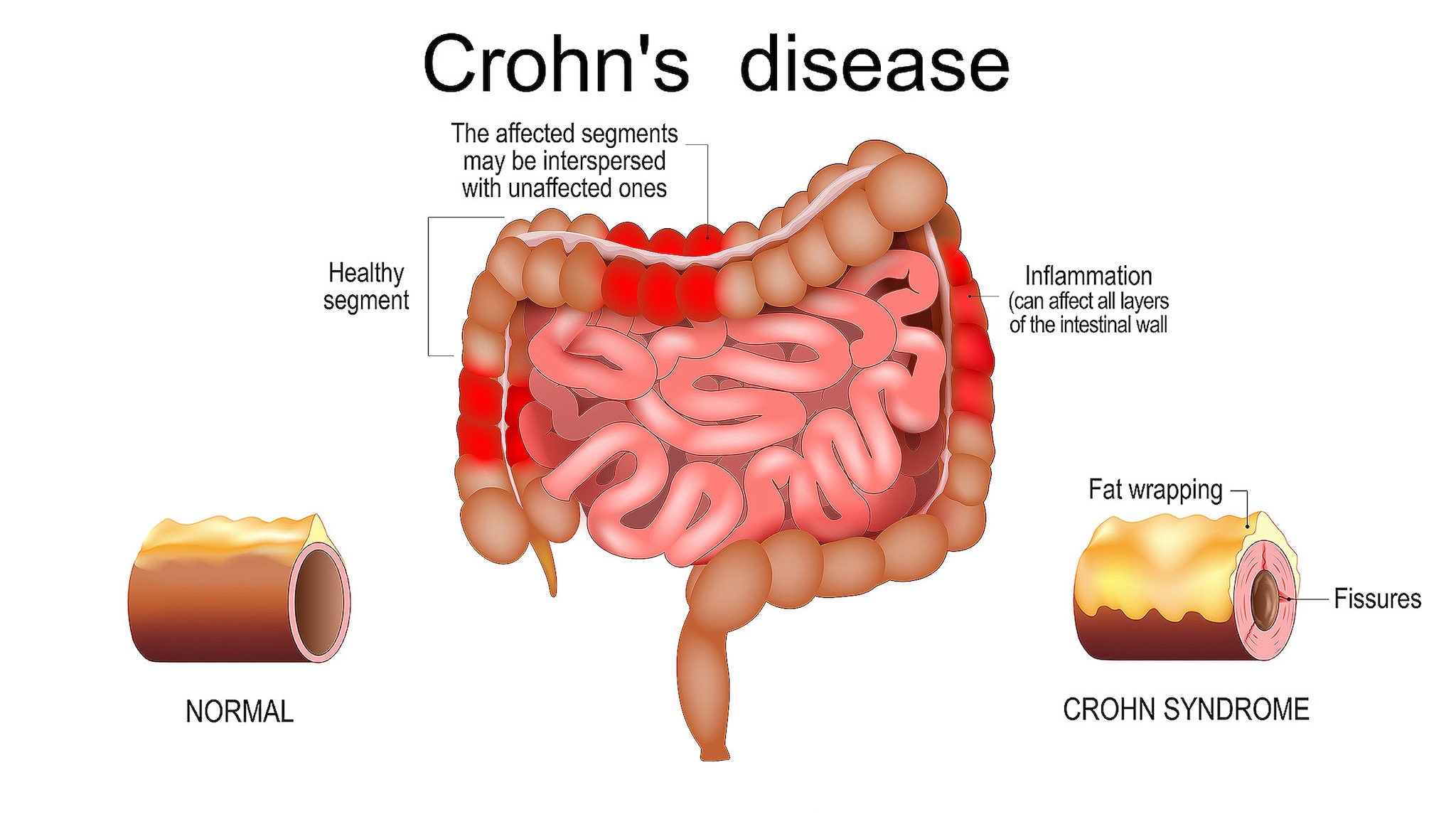Key points
- Crohn’s disease is a type of inflammatory bowel disease (IBD) that can affect any part of the digestive tract, from the mouth to the anus.
- It inflames areas of the intestine walls, causing patches of damage that can reach the outer lining.
- People with this disease may experience diarrhea, mouth sores, or malnutrition.
- Complications can be serious, but most people with Crohn's disease can control their symptoms and lead active lives.
Overview
Inflammatory bowel disease (IBD) refers to a group of lifelong diseases that cause inflammation (swelling) of the intestine.
Crohn's disease is one of the main types of IBD.
Crohn's disease can impact a person's quality of life. But most people who have it can still lead active lives with long periods of remission.

How Crohn's disease impacts the digestive tract
Inflammation from Crohn's disease causes the walls of the intestines to thicken. This makes affected areas crack, forming tunnels or passageways in the intestine walls.
Crohn's disease can:
- Affect any part of the digestive tract, from the mouth to the anus, most commonly on parts of the small or large intestines (called the cecum and terminal illeum).
- Affect all layers of the intestine walls, moving outward.
- Cause swelling in patches, leaving areas of healthy tissue.
Symptoms
Crohn's disease symptoms
Many symptoms from Crohn's disease also occur with other types of IBD, like ulcerative colitis.
Crohn's disease can also cause some symptoms that are not usually seen with other types of IBD. These include:
- Diarrhea that is usually not bloody.
- Malnutrition—when parts of the digestive tract that absorb nutrients become inflamed.
- Mouth sores—as the entire digestive tract can be affected.
Severity of symptoms
Symptoms usually come in waves, and can range from mild to severe, depending on where the affected area is and how badly it is damaged.
Possible complications
Crohn's disease can put people at increased risk of developing other health conditions.
Most complications also occur in other types of IBD. These require extra monitoring.
The treatment for Crohn's disease usually controls some of the most common complications, such as:
- Ulcers. These are open sores that result from inflammation. Crohn's disease ulcers are deep lines that grow outward through the intestine wall.
- Anal fissures. This happens when inflammation creates small tears in the tissue lining the anus. This causes painful bowel movements and discomfort.
Contact your health care provider to discuss the risk of developing these conditions or if your symptoms change, worsen, or become persistent.
Emergency complications
Some complications may need additional attention, depending on where they happen in the body and how severe they are. These should be discussed with a doctor, although they are not usually life-threatening.
Fistulas and Abscesses
- Abscesses happen when an area damaged by inflammation gets infected, forming a puss-filled pocket that is usually swollen and painful.
- Fistulas happen when ulcers extend completely through the intestinal wall, creating a painful, abnormal passageway that connects to another body part. These can:
- Develop from the intestines to another organ or to the skin, even expanding outside the body.
- Have visible fluid draining out.
- Become inflected and fill with puss, forming an abscess.
- Develop from the intestines to another organ or to the skin, even expanding outside the body.
Strictures and obstruction
- Intestinal strictures happen when the intestines narrow, making it hard for digested food to pass through. They can be caused by:
- Thickened intestinal walls.
- Scar tissue from waves of flare-up and healing.
- Thickened intestinal walls.
If a complication becomes extremely severe or is left untreated, it may become life-threatening.
•Fistulas that develop in the stomach may become infected and form an abscess. This can cause digested food, fluids, or puss to leak inside the body.
•Complete intestinal obstructions occur when strictures narrow so much that the intestines actually become blocked. This prevents the movement of food and stool (poop) entirely.
If you think you are experiencing one of these life-threatening complications seek medical attention right away.
- Bruner LP, White AM, Proksell S. Inflammatory bowel disease. Prim Care. 2023;50(3):411–427. doi:10.1016/j.pop.2023.03.009
- Agrawal M, Spencer EA, Colombel JF, Ungaro RC. Approach to the management of recently diagnosed inflammatory bowel disease patients: A user's guide for adult and pediatric gastroenterologists. Gastroenterology. 2021;161(1):47–65. doi:10.1053/j.gastro.2021.04.063
- Lichtenstein GR, Loftus EV, Isaacs KL, Regueiro MD, Gerson LB, Sands BE. ACG clinical guideline: management of Crohn's disease in adults [published correction appears in Am J Gastroenterol. 2018 Jul;113(7):1101. doi: 10.1038/s41395-018-0120-x]. Am J Gastroenterol. 2018;113(4):481-517. doi:10.1038/ajg.2018.27
